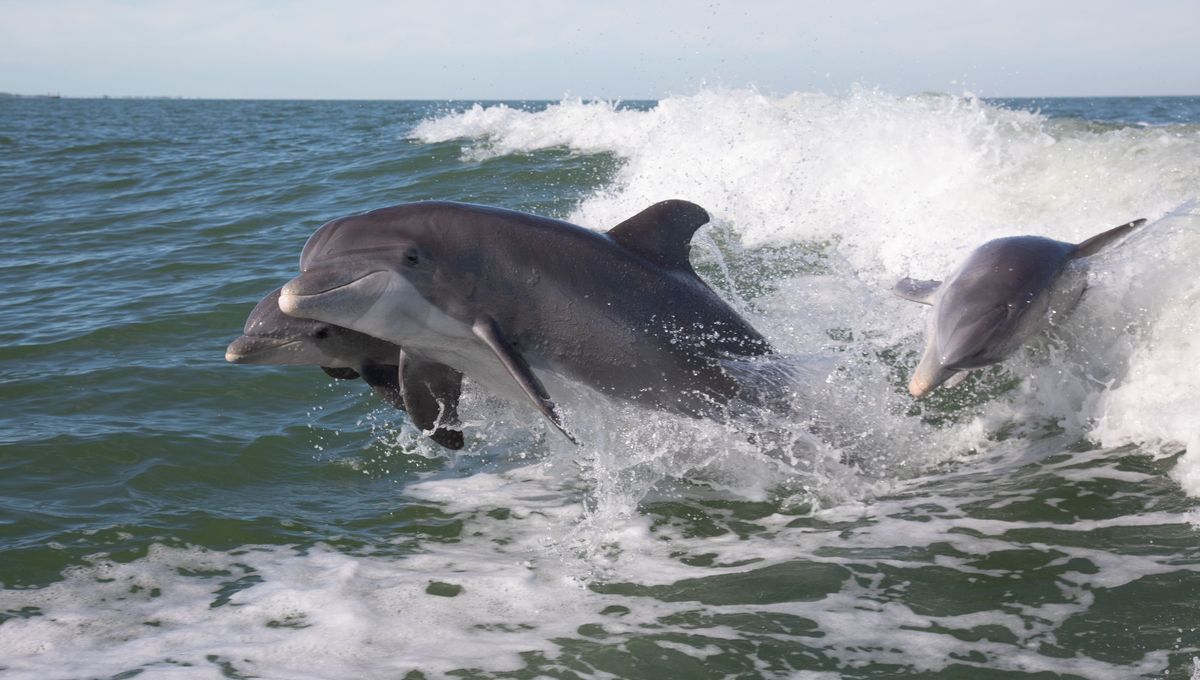
Dolphins might be famous for their impressive jumps or even their whistles and clicks but did you know that they also call each other by name and even have accents? These sounds are known as name-like signature whistles and have been known to researchers for quite some time. Now, new research has looked into whether the whistles might have other meanings than names.
One of the most studied pods of bottlenose dolphins (Tursiops truncates), comprising around 170 individuals living in the waters around Sarasota Bay in Florida, USA, was the focus of a new yet to be peer-reviewed study into whether these sounds don’t just transmit information but indicate a shared understanding of a concept. If verified, it would provide the best evidence yet that dolphins have language-like communication.
These dolphins also make noises dubbed “non-signature whistles” (NSW), which are used by 25-35 individuals within the pod. To find out what these NSWs might mean, the team came up with a playback experiment to see how the dolphins would react to different whistling noises.
The recordings were taken during health assessments, resulting in over 300 recordings that span 40 years of research. In addition, digital acoustic tags have also recorded data from more than 100 dolphins. This research has previously revealed the click-like names for individual dolphins and the relationships between mother dolphins and their calves. Because the team is sure which of the noises mean names, they can confidently exclude those noises from their data, and just focus on the noises that, until now, haven’t been assigned any meaning.
The playback experiments were conducted on free swimming dolphins, and involved launching a drone with the hydrophone deployed under the water. The playback was the same sequence repeated with 2-3 seconds pause in the middle. This constituted one trial before the playback was changed to a different sequence. Dolphins were typically exposed to two different playback sequences, though some individuals were exposed to up to four. The behaviour of each dolphin was recorded during the playback sequences and for 10 minutes after the last one was heard.
The results suggest that even noises that aren’t related to names can still be shared in the dolphin group. One such noise called NSWA was thought to be an alarm response and elicited negative responses. A different noise known as NSWB was produced when the dolphins were unsure, and is thought to be a query type noise.
“I’ve actually spent most of my career arguing that there isn’t evidence for language-like communication in dolphins, but I do feel like a lot of the pieces are there in dolphins. Like the fact that they are flexible, lifelong vocal learners,” first author Laela Sayigh told New Scientist.
The authors suggest that a larger sample size is needed before they can draw any conclusions. The team thinks having more data would make the results easier to interpret, for instance some dolphins turned towards the playback noise, before swimming away while others stayed in position rather than coming closer to the noise.
“Overall, our study provides the first evidence in dolphins for a wider repertoire of shared, context-specific signals, which could form the basis for a language-like communication system,” conclude the authors in their paper.
In case the researchers don’t get there first, you can see how AI is progressing with learning dolphin or read about the more unconventional historical approach.
The paper is a preprint available on BioRxiv.
Source Link: Chatty Dolphins Might Know More Language Than Just Each Other's Names, Reveals New Study